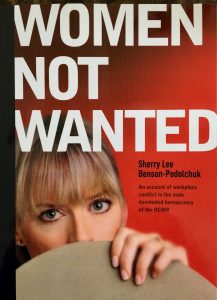Can you confront your bully?
Confronting the tormentor.
Having endured years of relentless workplace bullying in its most malicious forms, the journey to regain confidence and confront the bully was an arduous path paved with personal struggles and resilience.
A few years into retirement, a chance encounter with two former workplace tormentors stirred a visceral response, as if my very instincts were torn between fight and flight, momentarily eclipsing rational thought. Yet, having diligently undertaken the emotional work, those triggers now merely flickered for seconds. I approached one of them with unwavering confidence, (yet still nervous) extending a hand in a welcoming gesture, only to be met with a cold retreat. With arms behind her back, she callously rejected my outstretched hand, leaving her friends and colleagues beside her in disbelief at her stark incivility. Slowly unveiling my book, “Women Not Wanted,” I calmly remarked, “I was hoping I would see you. Here’s a copy.”

20 years in the RCMP dealing with sexual harassment and bullying.
Once more, she recoiled, citing an impending parade as an excuse to decline the offering. A friend of hers, however, recognized the book, expressing excitement about a previous interview and eagerly volunteering to take the book on her behalf. The disappointment etched on the faces of those around her mirrored the empowerment I felt — a poignant reminder that bullies ultimately unveil their true selves.
During the same conference and only a few minutes later while standing in line for the parade, under the cloudy sky and gentle raindrops, a familiar voice echoed behind me. Turning around, I was confronted by the specter of bullying boss number 2. Undeterred, I greeted her with a confident smile and a cheerful “good morning.” Her response, a scowl that betrayed displeasure at my presence, “What are you doing here, I didn’t you would be here!” My composed reply: “A little bit of rain couldn’t keep me away. Enjoy the conference.” Over the ensuing days, encountering these two pitiful individuals no longer instigated anxiety. Instead, I found myself feeling a sense of pity for them—a testament to my growth transcending their deplorable behavior.

Choosing between being a bully or a leader is a profound decision—one that shapes not only our character but the very fabric of our personal and professional lives. At any given moment, we possess the ability to embrace a higher form of communication and leadership, transcending the shadows of our past.
In my extensive career as an RCMP officer, I witnessed the disheartening truth that some bullies don’t aspire to change; in fact, they often thrive on the toxic rewards of their reprehensible behavior. Shockingly, many of these individuals found themselves climbing the professional ladder, bestowed with leadership roles despite lacking essential skills in management, communication, and conflict resolution. Witnessing these promotions based on destructive conduct was a source of profound frustration over the years, especially observing how they mistreated their colleagues.
Under the oppressive cloud of workplace bullying, each day exacted a toll on both my physical and mental well-being. The consequences manifested as celiac disease, five unexplained miscarriages, infertility, depression, and even suicidal thoughts. Eventually, a diagnosis of PTSD underscored the gravity of the psychological trauma endured. It would be logical to assume that my life was over, yet here I stand, steadfastly refusing to let my past and the bullies define me.
Self-care tools, a positive attitude and therapy emerged as my sanctuary, teaching me the invaluable art of self-care—nurturing my mind, body, spirit, and emotions with tailored tools and strategies. This became an indispensable lifeline, especially in the throes of workplace adversity. Recovering from a psychological injury is an arduous journey, one where some individuals sadly never find their way back to a new version of themselves.

I love me. Let me impress upon you the gravity of this truth: we are forged by our experiences—the good, the bad, and the downright harrowing. Despite the trials that threatened to break me, I wouldn’t change a thing about my past. It’s within the crucible of adversity that the most resilient and beautiful facets of my being emerge.
Embracing compassion, self-awareness, and a profound curiosity about my own boundaries and behavioral patterns, I learned to fathom the intricate layers of human existence. Understanding what propels someone into the role of a bully became a crucial inquiry, a question that demanded emotional excavation.
Completing the emotional work doesn’t insulate us from triggers that may surface unexpectedly, like tempests from the left field, threatening to plunge us back into the abyss of fear and victimhood. Yet, armed with mindfulness during these moments, the impact of trauma is lessened, allowing life to unfold in a positive and successful trajectory.
Today, I stand not as a victim of my past, but as a testament to the indomitable human spirit that can weather any storm. There is nothing special about me in how I learned to speak up for myself every day, it is awareness and practice, recognizing people won’t change and setting boundaries. My journey is a beacon of hope, reminding others that, despite the darkness, the power to reclaim one’s voice and rewrite their narrative is a formidable force. Never give up.
Facing our tormentors head-on becomes an act of empowerment, it is a choice, particularly when preceded by the diligent undertaking of emotional work. Not an easy task but it is worth the effort. Some folks prefer to write a letter never intended to send, it is like a catharsis, releasing that negative energy onto paper/journal. It involves navigating the intricate landscape of triggers, trauma, and boundaries, and the painstaking process of rebuilding confidence.
It is a choice in deciding who is good for you and who is not. People do what they need to do to survive and thrive. Empowerment is in believing in the power of your voice and not letting the bully define your future happiness and success.
